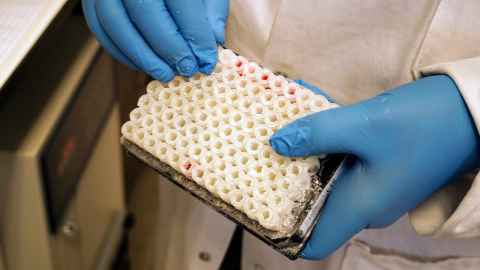Dementia Prevention Research Clinics send blood samples to Sweden for biomarker analysis
22 December 2020
University researchers involved with Brain Research New Zealand's Dementia Prevention Research Clinics are celebrating an exciting success.

After months of extensive preparations in Auckland and with the help of DPRC Tissue Banks in Christchurch and Dunedin, Dr Erin Cawston (Department of Pharmacology and Centre for Brain Research) and her DPRC Tissue Bank team couriered off some precious cargo across the world. They sent blood samples of 425 visits from 205 study participants to Professor Henrik Zetterberg’s lab at the University of Gothenburg, Sweden. The samples will be analysed for six neurodegenerative blood markers, lowly expressed proteins such as amyloid, tau and neurofilament light. This may help to determine how much amyloid build-up might be in participants’ brains, and hopefully allow the team to classify and predict changes occurring in very early Alzheimer’s disease in a non-invasive way.
“It feels like a new beginning for our DPRC study,” Erin says.
We’ve gone through the difficult phase of setting everything up, recruiting participants, and collecting data. Now, we’re finally starting to get information from our samples and soon we’ll be able to feed back on our findings.
The technology used for the measurement of proteins of interest from the DPRC samples in Sweden is called Single-Molecule Arrays (Simoa) and is currently not available in New Zealand. However, Erin has recently been awarded a Lottery Health Research grant that will enable the purchase of the Quanterixä SR-X Digital Immunoassay Instrument Suite that utilises Simoa, and will allow the team in the future to measure analytes of interest themselves, right here in Auckland. This is an exciting development for our local neuroscience landscape, as the machine will also be used by other research groups working on conditions such as Parkinson’s disease, frontotemporal dementia, Huntington’s disease, and traumatic brain injury.
In the meantime, the DPRC team is expecting initial data from Sweden early next year, and they are eager to start analysing the results. They are also aiming to send another 75 blood samples for analysis from a study led by Dr Catherine Morgan and Professor Michael Dragunow, which looks at analytes of interest in the blood and how these relate to blood brain barrier breakdown measured by novel MRI techniques.
Associate Professor Lynette Tippett, National Director of the Dementia Prevention Research Clinics comments, “This is a great way to end what has otherwise been a very difficult year for the DPRCs. Erin developed the collaboration with Professor Zetterberg during a visit to Sweden, which fortunately took place before the arrival of Covid-19! As a result of this, combined with the hard work of the DPRC Bloodbank and clinical teams across the country, we are now awaiting with great excitement, the data from these analyses in Sweden. This is an undoubted milestone for the DPRC longitudinal study.”
Republished with permission from Brain Research New Zealand, 'Dementia Prevention Research Clinics send blood samples to Sweden for biomarker analysis'.